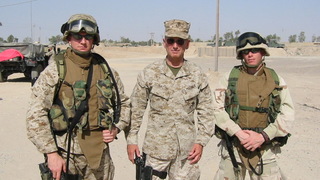
Today, President-elect Donald Trump’s pick for defense secretary, James “Mad Dog” Mattis, faces his Senate confirmation hearing. Mattis reportedly received his nickname “Mad Dog” after leading U.S. troops during the 2004 battle of Fallujah in Iraq, where he is accused of carrying out war crimes by our guest, Aaron Glantz, a senior reporter at Reveal from The Center for Investigative Reporting.
Transcript
AMY GOODMAN: We move now to a hearing that’s expected to happen today. Nermeen?
NERMEEN SHAIKH: President-elect Donald Trump’s pick for defense secretary, James “Mad Dog” Mattis, faces his Senate confirmation hearing today. This comes as House Democrats are threatening to revolt over the waiver needed for Mattis to serve as defense secretary, after the Trump transition team blocked him from testifying before the House Armed Services Committee. Mattis only retired from the military in 2013, meaning he needs Congress to waive rules requiring defense secretaries to be civilians for seven or more years after leaving the military. New York Senator Kirsten Gillibrand has said she’ll vote against the waiver for General Mattis, saying, quote, “Civilian control of our military is a fundamental principle of American democracy, and I will not vote for an exception to this rule.”
AMY GOODMAN: James Mattis reportedly received his nickname “Mad Dog” Mattis after leading U.S. troops during the 2004 battle of Fallujah in Iraq. He enlisted in the Marines at 19, fought in the Persian Gulf War, in Afghanistan, in Iraq, where he served as major general. In May 2004, Mattis ordered an airstrike in a small Iraqi village that hit a wedding, killing about 42 people who were attending the wedding ceremony. Mattis went on to lead the U.S. Central Command from 2010 to 2013, but the Obama administration cut short his tour over concerns General Mattis was too hawkish on Iran, reportedly calling for a series of covert actions there. Mattis has drawn criticism over his apparent celebration of killing, including saying in 2005 about the Taliban, quote, “It’s a hell of a lot of fun to shoot them,” unquote.
For more, we go to Washington, D.C., where we’re joined by Aaron Glantz, senior reporter for Reveal from The Center for Investigative Reporting. His latest investigation, “Did defense secretary nominee James Mattis commit war crimes in Iraq?”
Aaron Glantz, what did you learn?
AARON GLANTZ: Well, as you mentioned, James Mattis got the nickname “Mad Dog” for his command responsibility as a general during the April 2004 siege of Fallujah. This was a battle that I covered as an unembedded journalist, where the U.S. Marine Corps killed so many people, so many civilians, that the municipal soccer stadium of that city had to be turned into a graveyard. U.S. Marines there shot at ambulances. They shot at aid workers. They cordoned off the city and prevented civilians from fleeing. Some marines posed for trophy photos with the people that they killed.
And what we say in the story is that all of these events that occurred in Fallujah when James Mattis was the commanding general are the same sort of events that other commanders in other countries have been convicted of war crimes for, including General Yamashita, who was a general in World War II for the Japanese, who was tried and executed by a U.S. military tribunal, and his execution was upheld by the U.S. Supreme Court. We found that James Mattis likely committed similar war crimes.
AMY GOODMAN: You covered the siege of Fallujah yourself as an unembedded reporter, Aaron. We’re going to do Part 2 of this conversation after the broadcast and post it at democracynow.org. But what came of what he did there?
AARON GLANTZ: He, when that assault happened—and, importantly, he argued against the attack beforehand. And he said, very presciently, that so many civilians would be killed, that it would be ultimately damaging to the U.S. military’s overall occupation effort. But once that attack was launched, that’s exactly what happened. There was massive outcry across the Arab world, including in Iraq, a rise of insurgency across the country and a complete devastation of the city. I remember walking through the city shortly after the Marines pulled out, and there were rotting bodies all over the streets, because during the actual siege, U.S. Marine snipers would shoot at anyone who was outside, so people were afraid to go and bury the dead. Shopping centers were destroyed. And this gets to an important issue of disproportionality.
AMY GOODMAN: Ten seconds.
AARON GLANTZ: This whole assault was launched because of the killing of four Blackwater security contractors. And, you know, in response, James Mattis leveled the city.
AMY GOODMAN: We have to leave it there now, but we’re going to continue to cover this with our web exclusive.












Media Options